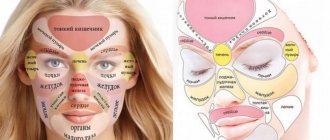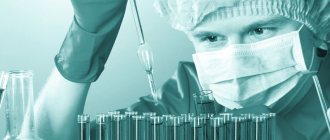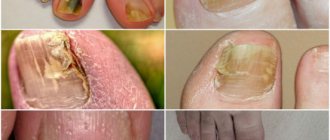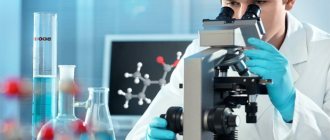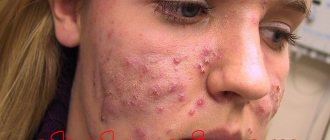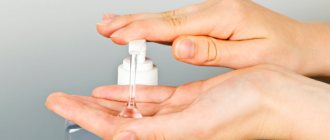Types
Experts believe that some types of acne break out on the skin due to hormonal changes.
There are several types:
- A comedon, or white pimple, is a sebaceous plug that clogs a pore. There are closed ones (they are located in the deep layer of the skin and are called “wen”, often the inflammatory process begins in them), and open ones (this is a black dot inside the pore). This type of acne is quite difficult to remove.
- Papule - forms if an infection has penetrated into the sebaceous plug. The area becomes red and inflamed, and pain is felt when pressing on it.
- A pustule is a pimple with purulent content. On the surface of the skin it looks like a white bump.
- A nodular cystic pimple is a group of small formations connected to each other by fistulous ducts.
- Fulminans are the most severe type of acne because they affect large areas of the skin. These problems are manifested by increased body temperature and pain in the affected areas. It is impossible to cope with the problem without medical help.
Any manifestation of this pathology requires immediate contact with a dermatologist.
Reasons for appearance
The formation of acne due to changes in hormonal levels begins under the influence of the following factors:
- Dietary changes: eating fatty and fried foods in large quantities.
- Inappropriate skin care, for example the use of skin cosmetics containing hormones.
- Diseases in the digestive system.
- A stressful condition that negatively affects the endocrine system.
- Age-related changes in the body.
- The climate is too hot and humid.
- Long-term treatment with steroid medications.
- Hereditary predisposition. Increased production of the hormone testosterone is inherited.
Even intestinal dysbiosis can provoke hormonal imbalance.
In teenagers
During puberty, both girls and boys experience a hormonal surge, which results in acne. During this period, the skin becomes worse as a result of increased sebum secretion and clogging of the sebaceous gland ducts.
The appearance of acne is also influenced by poor heredity in this regard. If parents suffered from acne as teenagers, then their children will experience the same.
Manifestations of acne
There are many different manifestations of acne. The most common symptoms by which acne can be distinguished from other skin pathologies are:
- The appearance of small pinkish, red bumps on the face, shoulders, and back.
- Pustules on the skin.
- Increased oiliness of the skin.
- Foci of pigmentation, scars on the skin in areas of rashes.
- A large number of blackheads, enlarged pores.
Also, patients with acne often note itching of the scalp, dandruff, and rapid hair contamination 1 day after washing.
In the absence of proper care and necessary treatment, acne can acquire severe and very severe forms, in which numerous ulcers, lumps, nodes and papules appear on the skin, and the risk of serious bacterial complications increases. When trying to independently squeeze out purulent elements, abscesses, phlegmons, as well as such a life-threatening condition as thrombosis of the cavernous sinus can develop.
To prevent dangerous consequences, it is important to see a dermatologist at the first signs of acne and undergo the necessary examination.
Among women
Most women experience uncomfortable acne before and after their periods. This is how the body responds to fluctuations in the level of steroid hormones.
If a woman’s body is not prone to acne, then several pimples appear during this period. This is the norm and does not require examination or treatment. If there is a predisposition, the rashes will be profuse.
A woman over 28 years old should not be bothered by this problem. Therefore, if multiple acne appears, you should seek help from specialists. At this age, acne indicates serious diseases that change the hormonal levels in the body.
The cause of the rash may be polycystic ovary syndrome or pelvic inflammatory disease. In this case, you need to undergo examination and receive adequate treatment.
Significant changes in hormonal levels can occur after an abortion. There are hormonal changes in pregnant women, but a rash does not always occur.
Treatment
- If the cause of acne is a hormonal imbalance in the body, drug therapy will be selected for the patient based on which hormones are produced in the body above normal or, conversely, are at low levels.
- Women are often prescribed oral contraceptives; they not only regulate hormonal balance in the body, but also normalize the menstrual cycle.
- If foci of inflammation are too pronounced, regular iodine helps speed up the healing of the skin. It must be applied with a cotton swab to each pimple.
- For extensive rashes and a large number of inflammatory foci on the skin, antibacterial drugs are prescribed. The antibiotic tetracycline helps treat acne in a short time. It is quite strong, but the effect of its use is visible after a few days.
What tests to take for acne on the face
In case of a significant problem, it is necessary to undergo the following tests for acne:
- Blood for biochemistry - allows you to determine the functioning of internal organs and identify disorders.
- Blood test for HIV infection - determines general suppression of the immune system, prescribed if additional health problems are detected.
- Analysis for CSR - detects the development of secondary syphilis.
- Scraping for cultural sowing - makes it possible to determine the development of subcutaneous mites and other bactericidal and viral diseases of the skin.
- A thyroid hormone test can detect thyroid disease.
In addition to the above, it is mandatory to take tests for sex hormones.
Video: Details
Steroid
Steroid hormones are those that are present in men and women, but in individual amounts.
Here we can highlight:
- corticosteroids;
- androgenic hormones in men;
- estrogen in women.
Acne appears due to an increased amount of male hormones. In women, a slight excess leads to profuse rashes.
Testosterone
Testosterone - produced in men and in certain situations in women, is responsible for sexual attraction to the opposite sex. Increased content is often inherited.
An increase in levels can be triggered by a woman’s pregnancy, adolescence (this is normal), and disturbances in the functioning of the adrenal glands and pituitary gland.
Read, treatment of facial acne in teenagers at home. About watery pimples turning into sores on the face. More details here.
Estradiol
Estradiol is a female hormone produced in the ovaries. A sufficient amount of the hormone promotes the production of collagen, which is why a woman’s skin remains young and elastic for a long time.
Insufficient production provokes the development of acne. Everything is explained by a decrease in the skin’s protection to external influences.
Cortisol
Cortisol is a stress hormone produced in the adrenal glands during periods of anger and abuse. When used in sufficient quantities, it helps heal wounds, but when taken in excess, it leads to the appearance of acne and other types of pimples.
Inspection
A dermatologist should not only examine your acne, but also perform a full body examination for symptoms of hyperandrogenemia in women (clitoral hypertrophy, changes in secondary sexual characteristics, increased body hair growth, hair loss on the scalp).
The dermatologist also examines the rash directly (inflammatory and non-inflammatory elements, localization, number of rashes, prevalence, presence of post-acne (scars, hypo- and hyperpigmentation)) and makes a conclusion about the degree of acne and the severity of the disease.
The doctor draws attention to the presence of excess weight and increased sweating. Based on the examination and medical history, the dermatologist or therapist makes a referral to other specialists.
What other indicators play a role?
If the tests are normal, dermatologists begin to determine other causes of acne.
The following points can be highlighted here:
- disturbances in the functioning of the digestive tract - diseases of the mucous membrane of organs interfere with the proper absorption of vitamins and beneficial microelements;
- poor diet – often reducing fatty and fried foods reduces the appearance of acne;
- detection of staphylococcus - provokes the development of boils and other purulent inflammations inside human organs, this leads to intoxication and the appearance of acne;
- improper hygiene – often the lack of regular hygiene causes the formation of comedones and other types of acne.
To determine the cause, you should be open and honest with your dermatologist.
When is it necessary to take it?
Testing to identify the cause of the formation of a large number of pimples is carried out at a certain time:
- blood tests only in the morning and on an empty stomach, it is forbidden to drink coffee or tea, or brush your teeth;
- sex hormones are taken from women on certain days of the menstrual cycle, which depends on its type;
- 2 days after sex and drinking alcohol.
Depending on the type of analysis, the doctor stipulates additional requirements for submitting biological materials.
Who is prescribed hormone tests?
Several signs indicate the presence of hormonal imbalance. If they are present, a dermatologist will recommend an analysis of the level of hormones in the blood.
The presence of small hairs on the upper lip may indicate hirsutism.
Hormone tests should be taken if there are manifestations of hirsutism. This term refers to excessive male-pattern hair growth in females. With hirsutism, terminal hair appears in girls on the upper lip, chin, chest, upper back, abdomen, buttocks and inner thighs. Terminal hairs are hairs that can grow for 2 years, reaching a significant length. The degree of hair growth also depends on the sensitivity of the hair follicles to androgens. It may be due to a hereditary factor.
Excess weight may indicate high levels of androgens in acne. With excessive production of male hormones, insulin sensitivity decreases. Insulin resistance and impaired carbohydrate metabolism cause uncontrolled weight gain. With excess body weight, the amount of specific proteins, sexsteroid-binding globulins (SSBG), which transport androgens, decreases. As a result, a large amount of free male sex hormones appears, which are converted into intracellular metabolites with high activity. For example, testosterone is transformed into dihydrotestosterone, the activity of which is 2 times higher.
Excess androgens cause menstrual irregularities. Therefore, hormone ratios in women with irregular cycles should be checked.
A characteristic sign of a high concentration of male sex hormones is the localization of acne in the lower part of the face, in addition, oily skin with enlarged pores.
Tests are prescribed for people who have been trying for a long time and unsuccessfully to cure acne with medications.
Acne after age 20 is a sign of hormonal imbalance. The presence of disorders is indicated by hyperpigmentation and roughening of the skin in folds (acanthosis nigricans).
What tests will you need to take for acne?
Acne is a common name for pimples, so testing here will have to be done on a general basis.
Among the most likely are:
- general blood analysis;
- bacteriological blood test;
- tests to check sex hormones;
- tests to check thyroid hormones.
Men and women are often prescribed different tests. Common blood tests include two types. Often, blood is additionally checked for glucose levels in order to detect diabetes mellitus in time.
Among women
The main tests for women include the determination of sex hormones - steroids, cortisol, testosterone and estradiol. They should be taken after menstruation - on days 3-6 and 20-22 of the cycle.
Before taking the test, you must give up sports, sex and strict diets. A pregnant woman should not take hormone tests, as they will not give an accurate result.
It is also not recommended to resort to treatment during lactation - it is important to wait until hormonal levels recover after pregnancy. This takes about 1.5 years.
In men
In men, dermatologists first check the functioning of the thyroid gland, since its function often malfunctions due to smoking and alcohol. The thyroid gland is checked if there is gynecomastia - breast growth in a man.
If no problems are found in this case, they begin checking for hormonal disorders, to which men are not susceptible.
Often, to prevent acne, a man is forced to quit smoking, since blood tests reveal general intoxication of the body.
Test results and further course of treatment
If a hormonal imbalance is detected, its cause must be determined. The formation of sex hormones occurs in the ovaries, testicles, and adrenal glands. This process is controlled by the pituitary gland and hypothalamus.
Among women
Based on the results of the initial diagnosis, further laboratory tests, ultrasound of the pelvic organs, MRI of the brain, and tomography of the adrenal glands may be prescribed. It is necessary to exclude diabetes mellitus (glucose in the blood and urine, glycated hemoglobin).
The most common cause of hyperandrogenism in women is polycystic ovarian changes. In this case, the use of contraceptive drugs that inhibit testosterone synthesis is indicated - Yarina, Diana 35, Jess.
In men
In men, the background process for acne may be pathology of the adrenal glands, taking hormonal drugs to build muscle mass, or changes in the function of the gonads. If the diagnostics did not reveal any deviations from the norm, then it is recommended to culture the microflora (smears of the skin in the area of the rash), tests for intestinal dysbiosis, subcutaneous mites (demodex).
How to pass correctly
To determine the problem, it is important to get tested correctly, so you should follow your doctor’s recommendations.
To make the results more accurate, you must:
- be in a good mood - you should not resort to examination during periods of mourning and other experiences;
- the day before, do not eat heavy and unhealthy foods - fried, fatty, flour, salted, smoked, spicy foods are prohibited; it is also not recommended to consume large amounts of protein;
- if a person takes any medications on an ongoing basis, the doctor must be informed about this; on the eve of the test, one should not take strong drugs - antivirals or antibiotics;
- sexual intercourse should be avoided;
- You cannot donate blood after playing sports; you should avoid exercising in the evening.
Photos before and after
Look, a recipe for acne mash made at home. How to get rid of acne on your face at home? Find out further.
How to get rid of acne spots?
The answer is here. It’s not enough to decide to get tested to determine the cause of acne. It is important not to distort the indicators, so you must adhere to the rules indicated above, as well as a dermatologist who will study the examination results and prescribe treatment.
Video questions to the doctor about acne:
Acne is a fairly common problem that many people face with the need to correct it. However, not everyone turns to a specialist for this, and only a doctor can help in diagnosing acne and choosing the optimal therapeutic program for the clinical case. It is important to understand what tests need to be taken for acne, how to correctly interpret the results of the study, and how the course of the prescribed treatment will depend on them.
